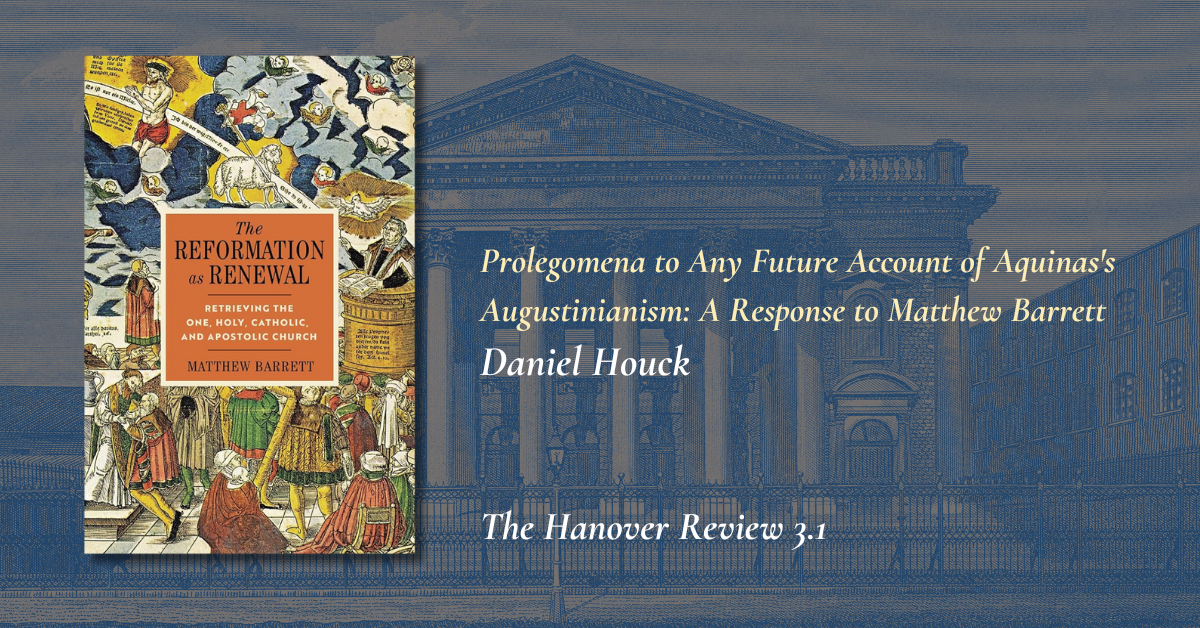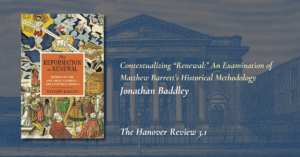Note: This is the online version of an essay from the Hanover Review 3.1 on the Reformation as Renewal Symposium. Print copies are available here and full digital copies of the issue are available here. Full details about the symposium can be found here. More information about the Hanover Review is found here.
1. Introduction
It is more interesting, in symposia such as these, to focus on areas of disagreement rather than agreement, and I will accordingly focus on the former; but that should not be taken to imply there are none of the latter. Matthew Barrett’s positive engagement with Thomas’s theology from a Southern Baptist perspective is most welcome and should spur further such engagement from theologians, Baptist and otherwise. In making his case to a broader evangelical audience that much of Thomas’s theology is ripe for retrieval, Barrett seeks to highlight the common ground between Augustine and Thomas. As Augustine is better known to, and more trusted by, Barrett’s target audience than Thomas, this makes sense. If I believe you’d be good friends with someone you currently distrust, what better way to change your opinion of the person than by arranging a sit-down with you, him, and a mutual friend? This is, in effect, what Barrett seeks to do with evangelicals and Thomas: have them sit down with their mutual friend, Augustine, for the sake of enriched understanding, and eventually, hopefully, friendship. Though Barrett doesn’t call his project “ecumenical,” the strategy of looking to Augustine’s influence on Thomas has been a common, fruitful one in ecumenical theology.1Seminal examples include Henri Bouillard, Conversion et grâce chez s. Thomas d’Aquin (Paris: Aubier, 1944); and Otto Hermann Pesch, Theologie der Rechtfertigung bei Martin Luther und Thomas von Aquin: Versuch eines systematisch-theologischen Dialogs (Mainz: Matthias-Grünewald, 1967). All this is well and good. That said, because in recent generations the scholarly pendulum has swung toward emphasizing the continuity between Augustine and Thomas, it has become easy to underemphasize the very real discontinuities that do exist between them. This is, I contend, what has happened in The Reformation as Renewal. For Barrett, the mature Thomas is a “Sounder Scholastic” whose work, especially the Summa theologiae, “retrieved and synthesized classical Christian orthodoxy and Augustinian soteriology, to which the sixteenth- century Reformers were indebted.”2Matthew Barrett, The Reformation as Renewal: Retrieving the One, Holy, Catholic, and Apostolic Church (Grand Rapids: Zondervan, 2023), 117. One gets the impression that there is little to no daylight between Augustine’s and Thomas’s soteriologies: Augustine developed a “classical” soteriology; Thomas (and later, the Reformers) retrieved it. There is no indication that Thomas rejected some of Augustine’s soteriological views, no discussion of the broader salient differences between Thomas’s and Augustine’s anthropologies, and a fortiori, no explanation as to why the soteriological agreements between Thomas and Augustine constitute something fittingly called “Thomistic Augustinianism.” The question is not whether Thomas’s soteriology should be called “Augustinian” in a broad sense—for example, insofar as he affirms the doctrine of original sin with Augustine, over against Pelagius. The question is whether, given Thomas’s differences with Augustine, the commonalities between them warrant lumping Thomas with Augustine over against later scholastic theologians whose theologies proved so controversial in the sixteenth century, and more broadly, the precise extent to which Thomas did and did not follow Augustine in general. My response here focuses on highlighting a few salient differences between Augustine and Thomas, in the hopes of helping prepare the conditions for these latter questions to be addressed.
2. Original Sin, Human Nature, and Sanctifying Grace
We can begin with a clear-cut case of soteriological disagreement between Thomas and Augustine: the punishment infants deserve for original sin. There is (and always has been, due to the clarity and prominence of the salient texts) consensus that Thomas and Augustine had different views here. On Augustine’s mature account of original sin, unbaptized infants are justly condemned by God to an eternity in hell on account of their seminal presence in Adam’s loins when he sinned. It is false to say they are condemned for an action that occurred before they existed, because, although they didn’t exist in the particular form they would as individuals, they did exist in seminal form, in Adam. True, Augustine allows that theirs will be the lightest penalty in hell, because they never had the chance to add personal sins to their original sin in Adam; but they are not innocent, and not undeserving of the same kinds of penalties, such as hellfire, that Adam himself deserved. This theory of Augustine’s, needless to say, caused much grief over the centuries; see Thomas Hardy’s Tess of the d’Urbervilles for a moving literary example. But long before modern authors such as Hardy objected, a medieval consensus emerged against Augustine on this point. Thomas represents the culmination of this consensus, insofar as he, more clearly and decisively than anyone before him, rejected Augustine’s theory of the guilt of infants for Adam’s sin and offered an alternative account of their destiny.3See “Augustine and the Long Twelfth Century,” the first chapter of Daniel Houck, Aquinas, Original Sin, and the Challenge of Evolution (Cambridge: Cambridge University Press, 2020) (AOSE), for a discussion of Anselm of Canterbury, Peter Abelard, and Peter Lombard on original sin, which contains discussion of their rejection of (parts of) Augustine’s theory. N.b., I did not say that Thomas rejected the view that infants are guilty of original sin; he argued that they are, in an analogical sense. It would be unjust, Thomas argues, for unbaptized infants to be subjected to hellfire; on the contrary, though they will be excluded from the beatific vision, they will enjoy a full connatural happiness for all eternity in limbo.4See “Aquinas on the Effects of Original Sin,” 3 of AOSE. None of this disagreement is mentioned by Barrett. One might object that this is merely one point of disagreement—perhaps it is isolated, and “Augustinian Thomistic” soteriology is rooted in more fundamental agreement on human nature, grace, and the Fall?
Far from an isolated case, Thomas’s view of sin’s punishment is more like the tip of an iceberg: highly visible and small enough in itself, yet underlain by a massive, less visible base. The reason why Thomas is able to claim that infants who die unbaptized enjoy a natural knowledge and love of God is because he has reworked Augustine’s theory of the doctrine of original sin from the ground up, and relatedly has offered in an innovative account of human nature, original justice, and the transmission of original sin. In what follows, I draw on various works of Thomas’s, including his early Sentences commentary, to sketch the basics of Thomas’s account of original sin, nature, and grace; I have argued, at length, that these aspects of Thomas’s account of original sin remained even in his mature writings and after his encounter with the late Augustine.5“Aquinas on the Effects of Original Sin,” 3 of AOSE. I argue in ch. 2 that Thomas’s theology of original justice developed, and although that development did affect his theory of original sin in certain respects, the aspects of his account that I focus on here stayed, as I say, consistent.
Fundamental to Thomas’s account of original sin was a sharper nature- grace distinction than Augustine drew. Original sin is the lack of due original justice, and original justice was a gift from God to human nature, not something natural to the human being in the strict sense. What do I mean by “in the strict sense?” Throughout his writings, Thomas presupposes a distinction between the principles of human nature (the rational soul and animal body) and those properties that follow therefrom (risibility, for example), on the one hand, and properties that are good for human nature, on the other. Thomas spells this out in his commentary on Peter Lombard’s Sentences, and I have argued that he presupposes it in his later works.6AOSE, 3. Consider the following quotation, in response to the question, are “the defects which we feel penalties in us for the sin of the first human being?”7Scriptum Super Libros Sententiarum, P. Mandonnet (Paris: Lethielleux, 1929) [hereafter, Scriptum] II, d. 30, q. 1, a. 1. Translations mine unless noted.
These defects can be compared to human nature in two ways. First, they can be compared to human nature in its natural principles alone. In this respect, such defects are certainly not penalties but natural defects.… Alternatively, they can be compared to human nature as it was first instituted. In this respect, they are without doubt penalties.8Scriptum II, d. 30, 1, a 1.
Human defects (such as mortality, disordered concupiscence, and so on) are natural. In what sense? They flow from human nature, which has them when left to itself. They are not natural in a second, broader sense, however, because they are bad for human nature. When we remember that human nature was instituted without these defects, we can consider them to be penalties, but that is not because they flow from human nature— they decidedly do not.
Original sin leaves human nature to itself: that is, with its principles and what follows from them, such that a human being created by God without original justice and without original sin would be as weak, morally speaking, as a human being with original sin in the state of corrupt nature. In the following quotation, Thomas discusses what a human being would be like, created by God without original sin and without original justice:
If, by divine power, someone were formed from a finger, she would not have original sin. Nevertheless, she would have all the defects of those born in original sin, without the character of guilt. This is clear from the following. When God created humanity in the beginning, he could have formed a different human being from the mud of the earth—left to the condition of her nature, mortal and passible, feeling concupiscence rage against her reason. In this state nothing would be subtracted from human nature, because these defects follow the principles of human nature. Still, as this defect would not be caused through [human] will, it would not have had the character of guilt or penalty.9Scriptum II, d. 31, q. 1, a. 2, ad
This requires a sharp distinction between human nature and grace.10Technically, the distinction in the Scriptum at this point is between human nature and undue gifts to human nature, which could be subdivided into what theologians came to call “preternatural” gifts or “supernatural” See ch. 2 of AOSE for discussion of whether the formal cause of original justice was (supernatural) sanctifying grace or not. For one thing, they are separable, not only in the sense that through acts of sin, human beings can remain human while forfeiting divine grace, but in the sense that God could have created a human being in bare human nature.
Barrett doesn’t allow for any of this, nor does he cite, or interact with, salient literature on Thomas’s view of original justice.11“Thomas maintained the Augustinian emphasis on the primacy of grace by claiming the superadded gift was inseparable from man’s constitution, even given to man at creation itself. In other words, never was there a time when Adam was without it. The donum superadditum could be distinguished in the mind of the theologian but in Adam’s experience such a gift was inseparable from his existence at the start.” Barrett, The Reformation as Renewal, 148. Pace this claim by Barrett, as we have seen, the gift of original justice is separable from the human being, in the sense that God could have created the human being without it. For Thomas, the fact that the gift came simultaneously with creation does not entail that is inseparable. This distinction is maintained in the Summa theologiae; see AOSE, ch. 3, and cf. STh I-II, q. 81, a. 4. He then states that certain Reformed theologians went further than Augustine and Thomas. “And yet some of the Reformed believed the union had to be even more inseparable than Augustine and Thomas imagined. The gift was not merely superadded at creation but ‘given in the original human constitution’ itself.”12Barrett, The Reformation as Renewal, 149. It is not clear to me what “even more inseparable” means, as opposed to “inseparable,” but in any case, to the extent the Reformed held this, they were returning to a more Augustinian view, albeit now in (presumably conscious) rejection of scholastics such as Thomas who had developed a rigorous account of the distinction between nature and grace. It is not that Thomas couldn’t have imagined this; he argued for his position against those in the broadly Augustinian tradition. There are, it seems to me, good reasons for Thomas’s view. As Barrett acknowledges, on the view that original justice is natural to the human being in a strict sense, its loss leads to the loss of something fundamental. Barrett asks, rhetorically, “If the gift is not superadded but original, built into the natural constitution of man himself, then how much greater the loss of original righteousness at the fall?”13Barrett, The Reformation as Renewal, 149. This is the problem that Thomas identified, one that led him to a clearer nature-grace distinction than Augustine himself had drawn: if the loss of original justice was so great that something “fundamental to the human constitution” was lost, and relatedly, if original justice was “even more inseparable” to humanity than Thomas held—how does the human being continue to exist after the Fall? Thomas distinguished nature from grace in the way he did precisely to give a clear answer to that question; what was good for nature was lost, but the principles and properties of nature which are necessary for existence, remain. In other words, though Thomas was clear that original justice was given to Adam and Eve at creation—“concreated,” if you like—he was equally clear that God could have withheld the gift of original justice when creating human beings, precisely because it is a gift to human nature, one that is separable from human nature.
In sum, Thomas holds that human nature in the strict sense (the principles and properties of nature, and what follows from them) survives after the Fall, after the loss of the gift of original justice. Human nature in the second, broader sense (what is good for it) is corrupted, because we lost the good of original justice that directed us to God and gave us the ability to follow him without disordered concupiscence. I have argued, at length, that Thomas doesn’t change his mind on this.14See chapter 3 of Houck, Aquinas, AOSE. To mention one piece of evidence in favor of the continuity of Thomas’s view, as late as the Tertia pars it is clear that his view of the limbo of infants, which presupposes his account of original sin, remains intact.15STh III, q. 52, a.
Thomas defended the doctrine of original sin, to be sure, and thus in a broad sense is rightly labeled Augustinian rather than Pelagian, but then so did Duns Scotus. Yet Barrett wants to deny that Scotus is an Augustinian, because he allegedly departed from Thomistic Augustinianism:
Scotus departed from the Augustinian and Thomistic pessimistic posture towards humanity’s nature after the fall, which later put him in conflict with the Reformers…. Scotus was not committed, like the Augustinian-Thomistic tradition, to a definition of sin that runs deep, so deep that a sinner’s actions can ultimately be explained by the pollution of his nature.16Barrett, The Reformation as Renewal, 239.
It is beyond the scope of this response to compare Scotus and Thomas at length, but insofar as both held that original sin is the loss of an original justice that does not belong to human nature in the strict sense and that only later actions committed by humans with the use of reason prioritize created goods over the Creator, they were closer to each other with regard to their view of the effects of original sin than either was to Augustine. That said, it is misleading to say that original sin doesn’t “run deep” with regard to Thomas or Scotus; the loss of original justice affects the whole person, from body to (the lower and higher powers of) soul, and blocks one’s entrance into the kingdom of heaven. Thomas’s account did affect his moral theology, though, as Barrett is right to affirm. Thomas certainly denied that the human being can merit, even congruously, the initial reception of sanctifying grace for himself (STh I-II, q. 114, a. 5). It did lead Thomas to disagree with Augustine’s denial of pagan virtue, because human nature’s created goodness is not determined to act only out of self- love to the contempt of God. For Thomas, sin doesn’t run so deep as to rule out pagan virtue, which I have argued to be an advantage of his view.17Daniel W. Houck, “Timothy Keller Meets Thomas Aquinas: Common Grace, Human Nature, and The Question of Non-Christian Virtue,” The London Lyceum Ledger, December 18, 2023, https://thelondonlyceum.com/timothy-keller-meets-thomas-aquinas-common-grace- human-nature-and-the-question-of-non-christian-virtue/.
3. Conclusion
What implications does all this have for Barrett’s argument as a whole? Doing justice to the complexity of Augustine’s influences on Thomas would require Barrett to modify parts of his tome, including, for example, chapter five (described by Barrett as “one of the most important chapters in this book … one hinge on which its argument turns”18Barrett, The Reformation as Renewal, 205.), whose title reveals the importance of “Thomistic Augustinianism” for his argument: “The Via Moderna, Nominalism, and the Late Medieval Departure from Realism of Thomistic Augustinianism and Its Soteriology.” If there is no such thing as “Thomistic Augustinianism,” or if the concept is reconstructed in such a way as to take into account the real divergences between Augustine and Thomas, what does that mean for the alleged “departure” of the late medievals from “Thomistic Augustinianism”? That is a genuine, not a rhetorical question; I am not claiming that the concept couldn’t be refined, and that Barrett’s argument couldn’t be made in cogent form—only that it has yet to be. Broadly speaking, however, some of Barrett’s central concerns don’t seem to depend on getting the Augustine-Thomas relation right. For example, his stress on the catholicity of the Reformation. As one editor of this journal summed up Barrett’s concern: “the Reformation was not a total break with everything after Augustine but a series of variegated receptions of different strands of the church’s theological tradition(s), including threads from the high medieval period.” Or, as one blurb summarizes, avoiding the idea that it is a “repudiation of the mainstream of medieval Christianity.”1919. Craig Carter, The Reformation as Renewal, iv. Or as Barrett himself puts it at one place: “To be clear, the Reformers did not think of the Reformation as a return to exhaustive continuity with the past—that myth is not the claim of this book. At the same time, the Reformers did not think of the Reformation as a radical break with the past—a caricature this book seeks to remedy.”2020. Barrett, The Reformation as Renewal, 31–2, n. 91. Future scholarship will need to reckon with the once underemphasized continuities between the Reformers and the medievals, while also doing justice to the differences between various key figures, including Thomas and Augustine.
I have argued that Thomas’s soteriology and anthropology do not walk in lockstep with Augustine’s. As deeply influenced by Augustine as he was, Thomas nevertheless made his own, distinctive contributions to these loci. Now, if one’s goal is to follow the Reformers of the sixteenth century as closely as possible, that bodes ill for the increasing efforts to retrieve Thomas in contemporary Protestant circles. But why should that be our goal? Why not, instead, let Thomas be Thomas, Augustine be Augustine, and evaluate each’s theological proposals ultimately on the basis of how well they comport with, and enable us to understand, Holy Scripture? We don’t always agree entirely with even our closest human friends, after all; but that shouldn’t stop us from seeking understanding together.
Author
-

Daniel W. Houck (PhD Southern Methodist University) has served as senior pastor of Calvary Hill since 2018. Before coming to Calvary Hill, he completed his MDiv at Princeton Theological Seminary, a PhD in theology at Southern Methodist University, and worked as a research fellow at Trinity Evangelical Divinity School. He teaches theology at the John Leland Center for Theological Studies and is an author and speaker on the topic of Christianity and science. He is the author of Aquinas, Original Sin, and the Challenge of Evolution (Cambridge University Press, 2020).
View all posts




